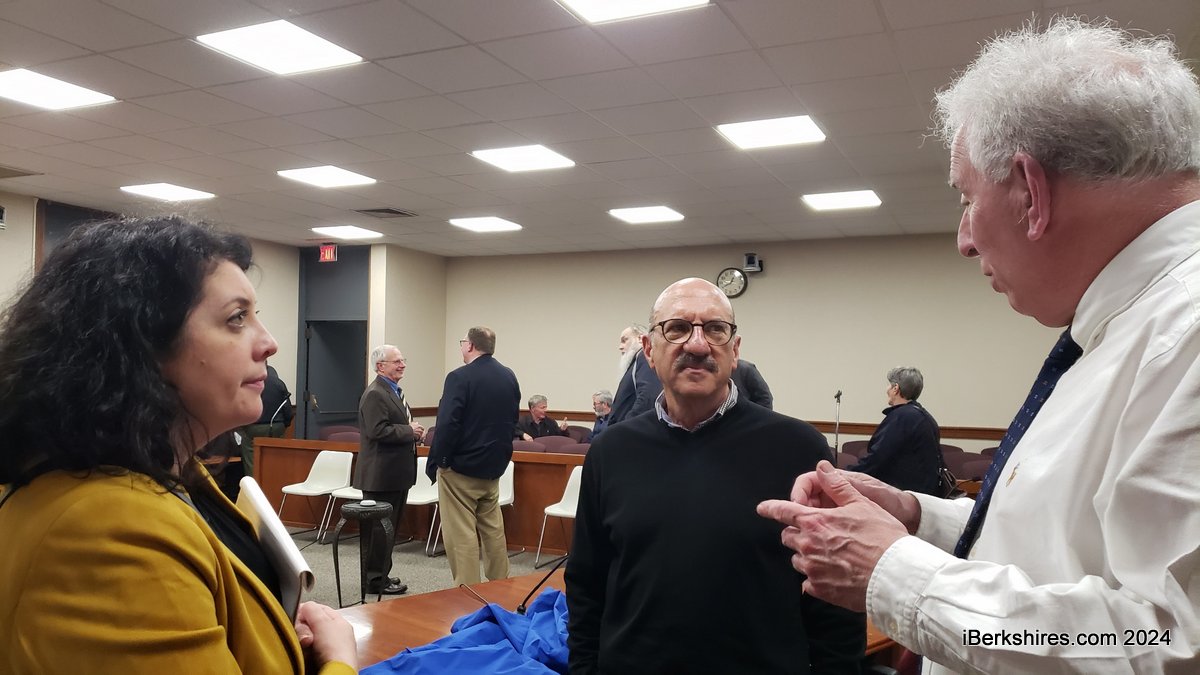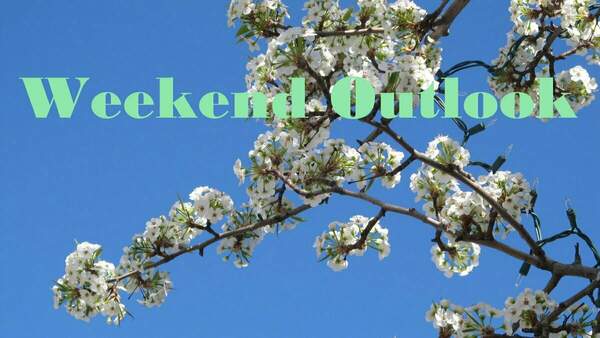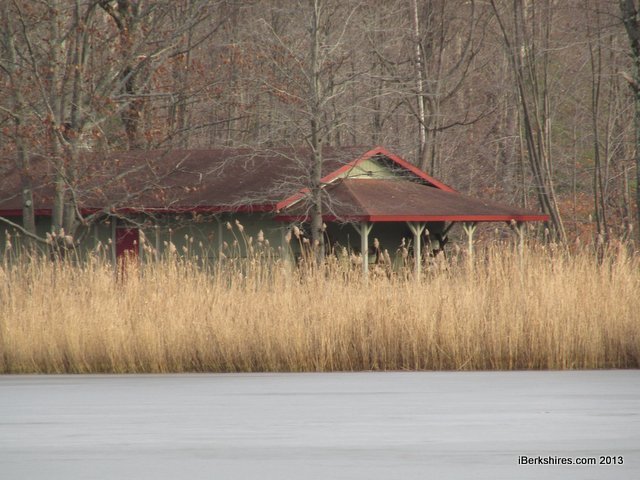
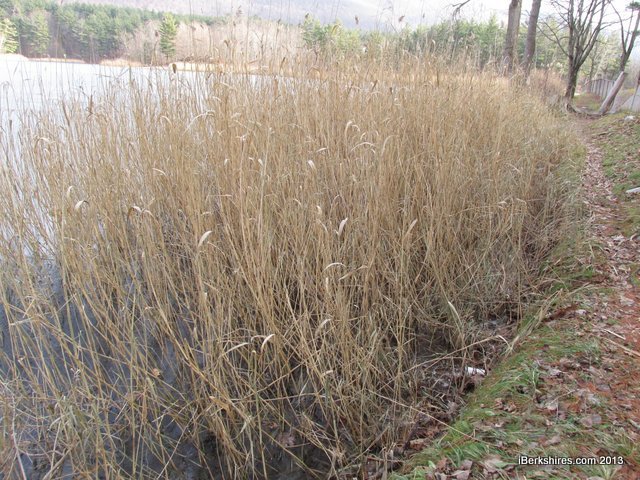
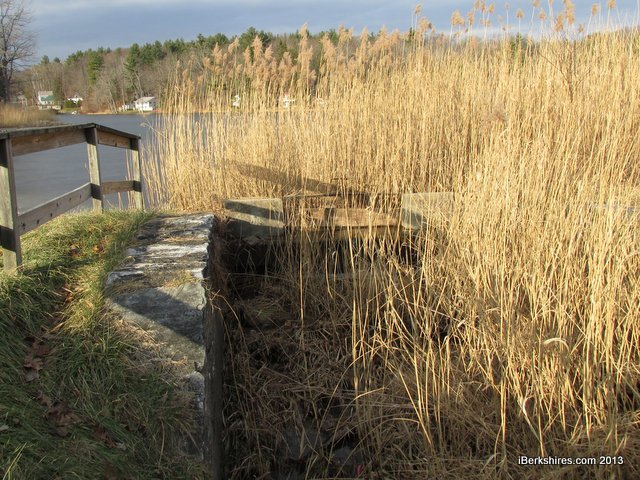
North Adams Seeking Solution to Lake Weed Invasion
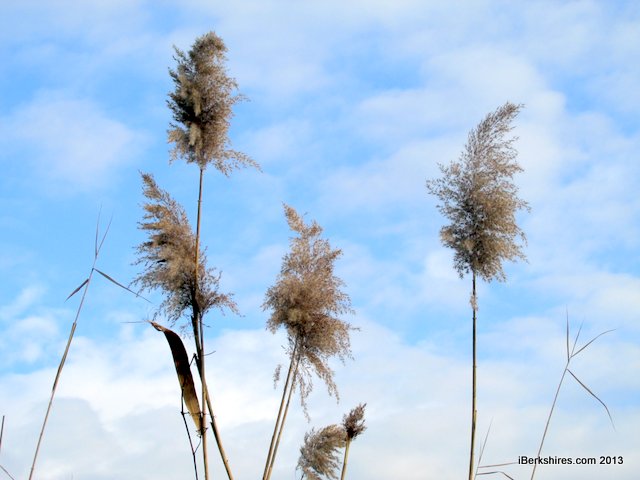 Phragmites have been taking over Windsor Lake over the past few years. Phragmites have been taking over Windsor Lake over the past few years. |
NORTH ADAMS, Mass. — Windsor Lake is being invaded.
A fast-growing weedy grass called phragmites Australis has been altering the contours of the city's prime recreation spot, encroaching on the beach and boating areas and endangering the ecology.
It's become enough of a problem that the Windsor Lake Recreation Commission is urging the city to attack the invasive plant head-on.
The commission in December sent a letter to the mayor's office prodding the administration to hire a professional company to deal with the issue.
"It's highly invasive and extremely dangerous to the ecosystems," said the commission's Chairman George Forgea back in December. "They can grow to 16-feet high and birds and animals can't live in them ... They're just bad news."
On Tuesday, Mayor Richard Alcombright and Administrative Officer Michael Canales meet with the to say they were getting the wheels in motion to deal with the plants.
The reeds can have root systems 50 to 60 feet long. They grow in dense clusters that kill native plants and fish and are difficult to eradicate fully.
Canales said he had spoken with one company and would have a ballpark figure for the next meeting on which to base the next step. The city had a couple options, he said.
"Treating each year is cheaper but we will have to continually do it," said Canales, or there is the more expensive proposition of spending upfront to eradicate the plant over about two years.
Forgea said he had been reading up on some of the techniques including those being used by a company hired by the state to clean up the Greylock Glen.
They include cutting the plants down to the ice line during winter, and applications during the growing season of heavy strength herbicides, such as Round-Up, by drip or by gloves (to prevent spread to other plants) or by a large sprayer.
Forgea said volunteers could cut the plants now down to the ice, "we almost went up there and started cutting."
Canales said a maintenance plan would first have to be submitted to the Conservation Commission, which would determine if the city would also have a file a notice of intent. If the Conservation Commission approved, volunteers could begin some removal before presenting a more formal plan from whichever company is hired.
In the meantime, he would also speak to the company working at the Glen and set up a meeting for the Conservation Commission. Forgea also asked if they could "officially" confirm the plants are phragmites.
Resident Richard Zona noted that the phragmite outbreak in Kampoosa Bog had been contained by volunteers. "It can be done without large cost to the city," he said. "But it would be labor intensive."
Commissioners indicated that they would like to begin the process as soon as possible and start cutting down the plants and burning them.
"If we were to do that, if nothing else, it's not going to eliminate the weed, but it would certainly help with the aesthetics of the place for the coming season," said Forgea. "Right now, you can't even see the lake from a good many parts.
"We have the volunteers and we have the equipment. We can do it."
The commissioners also voted to allow fundraising as along as it is for the full Windsor Lake complex. Donations for specific aspects can be earmarked in the Friends of Windsor Lake account.
New Historic Valley Park campground manager Cindy Rosenburg has already raised $2,000 in fundraising, including cookie sales, for playground equipment in the campground. She estimated the cost to be about $16,000 to $18,000.
Commissioner Nancy Bullett said she appreciated Rosenburg's initiative but was uncomfortable with asking for funds for an area not open to the general public, since only paying campers would be using the playground.
"We are not being fair to the kids who are not using the campground," she said.
Alcombright said Rosenburg had contacted Canales and himself first. "We kind of blessed that ... we really didn't think that part of it through."
Neither he and nor Canales saw it as a serious issue since the campground was owned and maintained by the city and it had been made clear to those donating the money that it was going to the campground play area. Canales said it is also on the list for improvements to conform with the Americans With Disabilities Act.
Alcombright said the city was trying for a state grant for up to $200,000 for playgrounds and had identified two - the public one at Windsor Lake and Kemp Park - as potential sites.
Rosenburg, however, said the campground, because it is a municipally owned enterprise, was not eligible for such grants.
"We're at the bottom of the totem pole," she said. Rosenburg also pointed out that the city had invested heavily in the campground's infrastructure to make it better because it is also a revenue source.
"I wanted to improve it for the kids, because if the kids aren't happy the parents aren't happy, and if they're not happy, you don't have campers," she said.
Commissioners agreed she should continue with a scheduled spaghetti supper on March 6 at the American Legion and they would brainstorm other options for fundraising at a next meeting.
Tags: campground, fundraising, invasive species, Windsor Lake,

